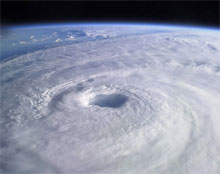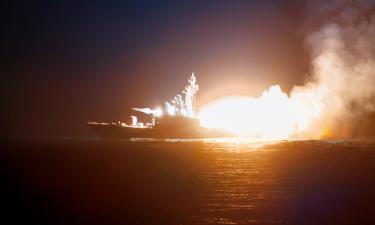Hurricane in USA causes global fuel crisis, consequences to vanish soon
The hurricane with a sweet women's name Katrina gave rise to a panic in the expert community
Hurricane Katrina, which hit the US Gulf Coast, has not set a record in terms of the economic damage yet. Moreover, analysts are certain that consequences of the current oil crisis, which Katrina caused, will soon be settled. The storm became another reason to aim oil prices upwards on the world markets and initiate another discussion about the oil future of the world. 
The unbelievable hurricane in the south-east has virtually ceased the oil extraction in the USA. The daily norm of oil shipments has been reduced by 92 percent. Seven hundred and eleven oil platforms and gas towers operating in the Gulf of Mexico (there are 819 of them in total) have been shut down in connection with the evacuation of the personnel. Katrina made the oil extraction in the area of the gulf drop by 91.7 percent (the gas extraction was cut by 83 percent). Hurricane consequences immediately affected the world markets. World oil prices for the forthcoming month made up $67.20 per barrel at New York Mercantile Exchange as of 29 August 2005.
The hurricane with a sweet women's name Katrina gave rise to a panic in the expert community. Some experts believe that the sudden and almost the total reduction of the oil extraction in the USA will eventually bring an immense damage to the US economy, from high prices on fuel to the overall decrease of the national industrial output.
It is not ruled out that US President Bush may succumb to pressure and tap the holy of holies of the USA – the nation's strategic oil reserve as prices soar. The reduction of strategic oil reserves in the United States is one of the reasons of skyrocketing prices on oil. According to USA Today, the Bush administration said it would consider lending oil from the nation's emergency stockpile to refiners that request it.
The time of Hurricane Katrina coincided with another rally of oil prices, which actually makes the only danger for the oil market, experts believe. “It is more actual for Russia than for the USA. The United States provides 50 percent of its oil needs itself. For the time being, there is no question about the issue of exhausted resources,” analyst with Gazprombank, Mikhail Zak said.
The specialist emphasized that demand has not been overtaking supply recently. “The growth of oil prices has not been caused with such objective economic consequences as demand and supply. It is a matter of investment activity,” Mikhail Zak told Pravda.Ru. “A hurricane can obviously disrupt oil shipments, but such failures can be quickly removed,” the expert added.
”Most likely, the current rapid rise in oil prices on oil markets of the world is not based on economic factors,” Andrey Vilde, the chairman of the expert department of IMA-Consulting said. According to the analyst, the real high price on oil can fluctuate between $50-60 per barrel. This level of oil prices is expected to be preserved until the end of the current year. “The time factor is quite relevant here, though. If the inflated demand remains on this level for quite a time, it will create a ground for a higher price limit. One should also bear in mind lobbyist opportunities of the USA and other Western states, for the current geopolitical situation is far from being close to conditions of the oil crisis, which occurred in the middle of the 1970s. I doubt that China is interested in purchasing oil at the price of $70 per barrel,” the expert concluded.
Will Russia be able to benefit from high oil prices? Mikhail Zak believes that it is much more important for Russia to appropriately handle the earnings, which will be received from the growth of oil prices. “The funds will mainly arrive in the state budget; oil companies will receive a small part of the profit. It will be up for our government to handle the profit effectively, use it in investments programs and provide the adequate distribution of the extra resources on the whole,” the analyst believes.
The price surge may negatively influence the inflation rate in Russia, and result in a rise of petrol prices, Mikhail Zak believes. “Russian oil companies try to keep up with the international level and even go above it, pushing aside ecological taxes, which exist in European countries, for instance,” Mr. Zak said.
Sergei Malinin
Subscribe to Pravda.Ru Telegram channel, Facebook, RSS!




